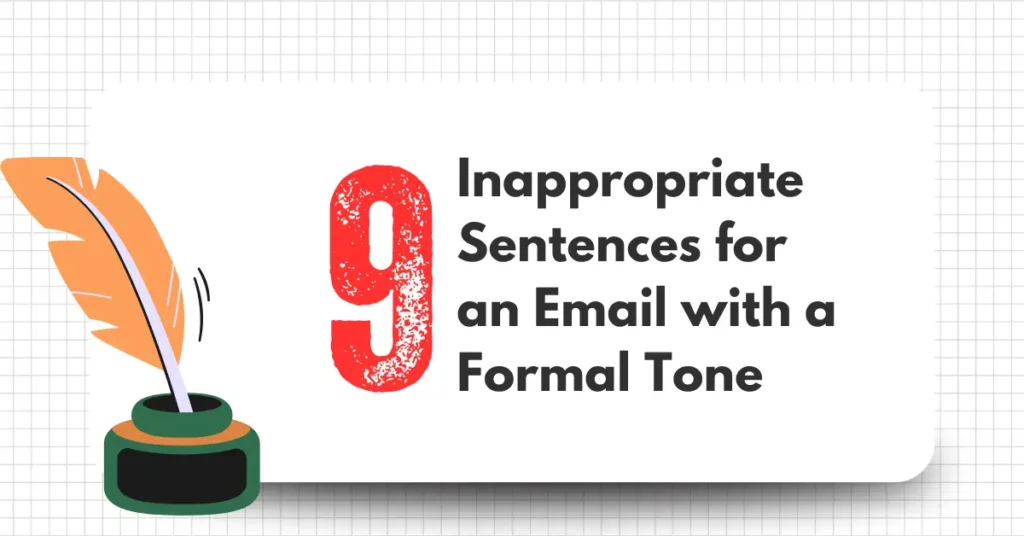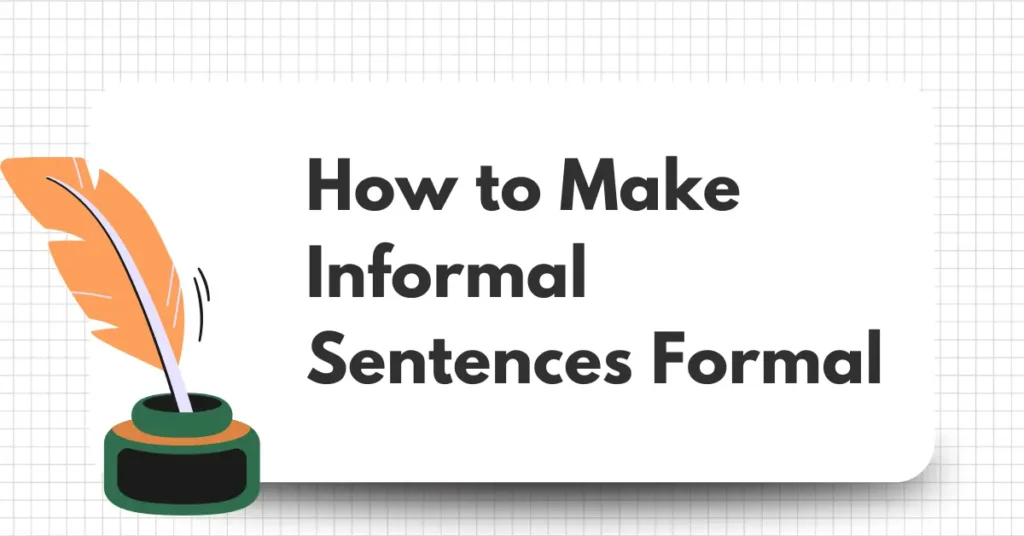When writing formal emails, it is important to use polite and professional language. Some sentences might sound too casual for formal communication, which could make your email seem unprofessional. In this lesson, you will learn how to recognize sentences that are too informal and how to replace them with more appropriate phrases for formal emails.
9 Inappropriate Sentences for an Email with a Formal Tone

Here are some sentences that may not be suitable for formal emails. They are too casual. These sentences are often used in casual or friendly emails, but they lack the level of professionalism needed for formal writing.
- Just checking in.
- How is everything?
- It was great talking to you.
- It was great meeting you.
- Just checking in to make sure that…
- I hope you’re having a productive day.
- I hope this message finds you in good spirits.
- I hope your week is off to a great start.
- Just a quick note to say…
How to Make Informal Sentences Formal

Let’s look at how you can change these casual sentences into formal ones:
- Just checking in. → I would like to follow up regarding…
- How is everything? → I hope this email finds you well.
- It was great talking to you. → Thank you for your time earlier.
- It was great meeting you. → It was a pleasure meeting you during [specific event].
- Just checking in to make sure that… → I wanted to confirm that…
- I hope you’re having a productive day. → I trust this email finds you in good health.
- I hope this message finds you in good spirits. → I hope this email reaches you well.
- I hope your week is off to a great start. → I hope your week has been productive so far.
- Just a quick note to say... → I am writing to inform you that…
Also Read: 40 Sentences for Beginning an Email
Practice Activity
Activity 1: Rewrite
Here is a small exercise to help you practice. Rewrite these casual sentences into formal ones:
- How is everything going?
- Just checking in to see if you received my email.
- It was great catching up with you yesterday.
- Hey, I just wanted to check if you got my email.
- How’s it going?
- It was awesome meeting you last week.
- Just following up on that thing we talked about.
- Hope you’re having a good one!
Take your time to rewrite them. Then, check the answers below:
Answers:
- I hope this email finds you well.
- I wanted to follow up to confirm if you received my email.
- Thank you for taking the time to meet with me yesterday.
- I wanted to follow up to confirm if you received my email.
- I hope this email finds you well.
- It was a pleasure meeting you last week.
- I am following up on our recent discussion.
- I hope you are doing well.
Activity 2: Fill in the Blanks
Complete the sentences below with a formal beginning:
- ________, I wanted to reach out regarding your recent inquiry.
- ________, I hope this message finds you well.
- ________, I would like to confirm our meeting time.
Answers:
- Dear Sir/Madam,
- Hello [Name],
- Good morning,
Tips for Writing Formal Emails
- Start with a Greeting
- Use “Dear [Name]” if you know the person’s name.
- Use “Dear Sir/Madam” or “To Whom It May Concern” if you don’t know the recipient’s name.
- Introduce the Purpose of the Email
- State clearly why you are writing. For example:
- I am writing to inquire about…
- I wanted to follow up regarding…
- State clearly why you are writing. For example:
- Keep the Language Professional
- Avoid using contractions like “I’m” or “you’ve.” Write the full forms instead: I am, you have.
- Close with Politeness
- End your email with polite phrases, such as:
- Looking forward to your response.
- Thank you for your time and assistance.
- End your email with polite phrases, such as:
- Use a Formal Sign-Off
- Examples: Sincerely, Best regards, Yours faithfully,
Example Formal Email
Subject: Follow-Up on Meeting
Dear Mr. Smith,
I hope this email finds you well. I am writing to thank you for the productive meeting we had on Monday. It was a pleasure to discuss our project ideas with you.
I wanted to follow up on the next steps we discussed. Could you please confirm if the meeting documents were sent to the team? Let me know if you need any additional information from my side.
Thank you for your time and support. I look forward to hearing from you.
Best regards,
[Your Name]
Why formal is better than informal?
Using formal language in emails shows respect and professionalism. This skill is especially important in business, academic, and official communication. Practice these sentences and tips regularly, and soon, writing formal emails will feel natural.
Keep practicing, and don’t forget to check your emails for proper tone and grammar before sending them!
Also Read: